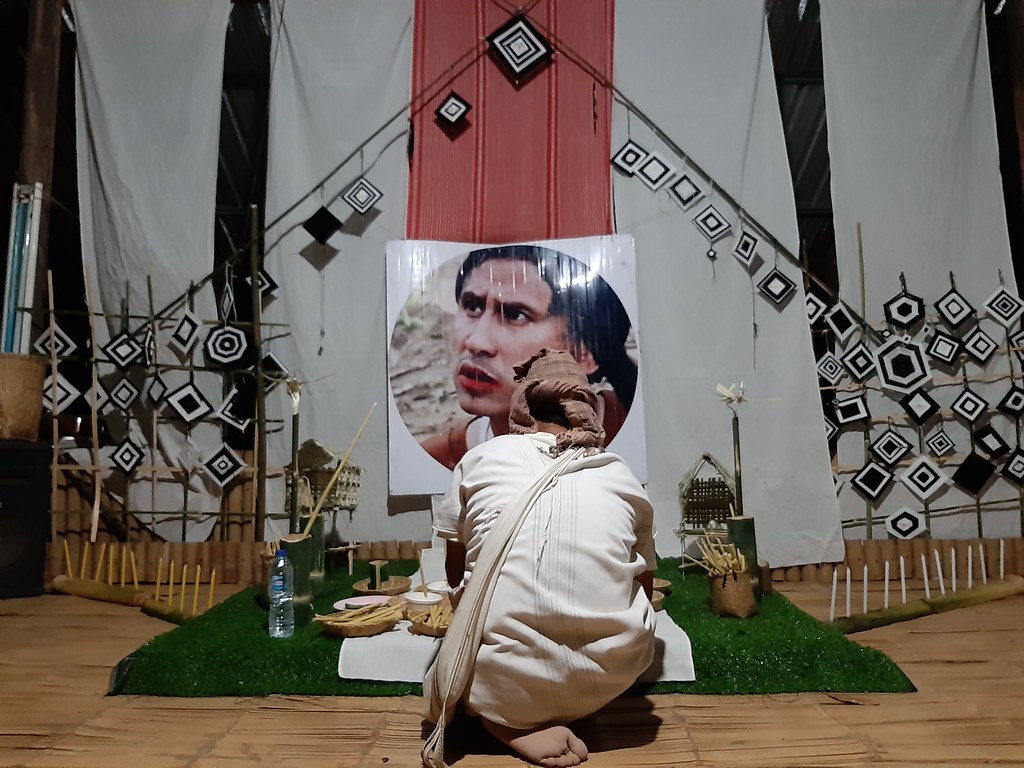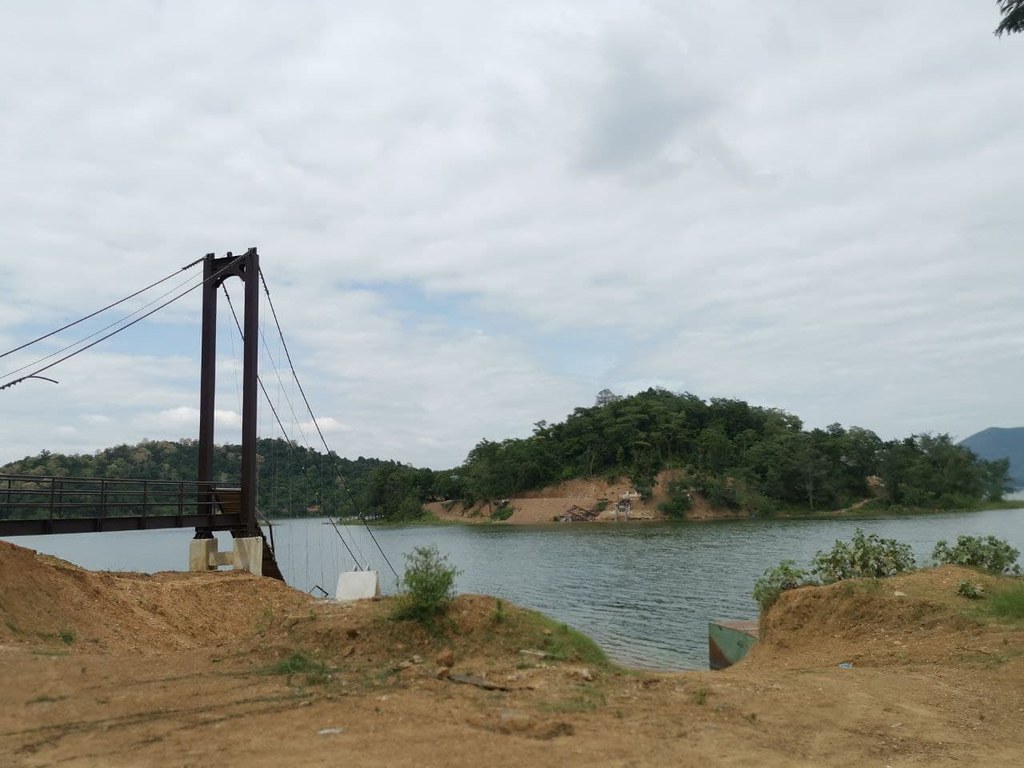Officials indicted for activist murder as ‘disappearance bill’ languishes


Main photo: Chaiwat Limlikitaksorn, the former head of Kaeng Krachan National Park and one of the indicted officials.
Public prosecutors have filed formal charges against a group of officials who stand accused of murdering and concealing the body of a land rights activist back in 2014. Despite the move, civil rights advocates remain skeptical that justice will be served in the case.

A Karen man offers a tribute before Porlajee “Billy” Rakchongcharoen in a commemoration event at Bang Kloi village. (File photo)
Four officials were charged with premeditated murder for their alleged role in the deadly abduction of Porlajee “Billy” Rakchongcharoen. The indictment coincides with an ongoing push in Parliament to enact the country’s first anti-disappearance law, a piece of legislation that many hope will end the practice of ‘forced disappearance’ targeting human rights defenders.
Pornpen Khongkachonkiet, director of the Cross Cultural Foundation, a rights watchdog group that has been assisting Porlajee’s family in pursuing legal actions, hailed the indictment as a belated victory. She said the move only came after her group filed a petition to the prosecutors beseeching them to take action.
“We’re happy to see that our complaints bear results,” Pornpen said. “And we’ve seen that the indictment includes major charges like premeditated murder. We agree with the action taken by the prosecutors.”
The charges were recommended by the Department of Special Investigation, or DSI, following the discovery of what the department identified as Porlajee’s burned remains in 2019. Pornpen said she hasn’t seen the case file submitted by the DSI so she doesn’t know if the evidence collected by the investigators will be enough to hold anyone accountable.
“Personally I’m worried that the court may rule that the evidence is insufficient, and then the case could be acquitted,” Pornpen said. “But I still have confidence in the DSI. I can see that their team working on this case is really committed.”
The four suspects indicted by the prosecutors include Chaiwat Limlikitaksorn, who served as the head of Kaeng Krachan National Park in Phetchaburi province at the time of Porlajee’s disappearance.
Porlajee was known for his campaigns to resist national park authority efforts to push a local ethnic Karen community out of the park. Park officials contend that the Karens illegally occupied the forestland; residents said they were living there long before 1981, when the land was designated as a national park.
Porlajee’s friends and family believe that he earned the enmity of park director Chaiwat for relentlessly campaigning on behalf of the residents, especially after park officials torched homes of local Karens in a bid to evict them. In recent years, members of the Karen community continue to face harassment and legal repercussions for insisting on their indigenous land rights.
Land of their hearts: the Bang Kloi indigenous Karen community on their long road home
Porlajee was last seen on April 17, 2014, after Chaiwat and his staff detained him for allegedly foraging for wild honey. Chaiwat insisted he merely questioned Porlajee before letting him go and denied any involvement in his disappearance.
Chaiwat was previously suspected of involvement in the killing of another Karen land rights activist, Tassakamon Ob-om, just three years prior to Porlajee’s disappearance. He was later acquitted by the court.

The Kaeng Krachan Dam, where the oil drum containing bone fragments likely to be Billy's was found.
It took years of campaigning on Porlajee’s behalf before the DSI announced that pieces of his skeleton were found in Kaeng Krachan National Park in 2019. His body was burned to conceal the crimeany evidence. Investigators subsequently identified Chaiwat and three accomplices as the most likely culprits, leading to their indictment.
“Eight years for an indictment, it took too long,” said Pornpen, the director of Cross Cultural Foundation. “It’s caused great damage to the justice system.”
In a brief interview with ThaiPBS, Chaiwat maintained his innocence and said that he would contest the charge.
Pinnapa Prueksapan, Porlajee’s wife, told The Reporters news agency she was cautiously optimistic about Chaiwat’s indictment but had been “waiting for this news for so long that I have almost lost my hope.”
“Now that this day has arrived, I’m feeling nothing,” Pinnapa said. “I don’t want to be delighted because I’m afraid of disappointment.”
Making disappearance disappear
Apart from punishing those responsible for her husband’s death, Pinnapa said she also hopes for a legal closure that would confirm his fate – she said she’s been forced to keep paying life insurance premiums for Porlajee, despite his apparent murder, because the company does not consider him to be dead without an official death certificate.
“I want to see the [perpetrators] punished soon, because it would help ease the stress that Billy’s family is going through,” Pinnapa said, using Porlajee’s nickname. “So they won’t have to live in fear anymore.”
The Kafkaesque legal standing of individuals who have been forcibly disappeared stems from the lack of recognition of enforced disappearance in the Thai judicial system. Under current criminal procedures, a murder trial can only be pursued if investigators retrieve physical evidence, namely, body parts.
Civil rights activists say the practice creates a loophole for perpetrators of forced disappearance to escape criminal punishment by kidnapping their victims – like human rights defenders and monarchy critics – and killing them without leaving any trace.
After years of advocacy by civil rights groups like the Cross Cultural Foundation, the Parliament in September 2021 adopted the draft of what’s slated to be the first ever law to address forced disappearance.
Pornpen from the Cross Cultural Foundation, who’s been consulted in the drafting process, said if passed, the law would introduce many measures to prevent security force personnel from “disappearing” their victims.
Since many cases of suspected torture and enforced disappearance occur while victims are in police custody, the bill will require police to record the entire process of detaining a suspect – from taking someone into custody, through to handing the person over to investigators. They will also be legally obliged to notify local authorities outside the police command whenever an arrest is made.
“I think the law will have many benefits,” Pornpen said.
The draft bill is still being deliberated in the Parliament, after a majority in the Senate, an unelected body mostly handpicked by the Prime Minister Prayut Chan-o-cha, voted to amend some of its provisions. As a result of those changes, the bill was returned to the lower House for approval. The draft will have to be adopted and enacted before the current term of the Parliament expires in early 2023. Otherwise, the process will have to start again from square one when the next set of lawmakers is sworn in.
Pornpen said the differences are mostly minor and did not affect the spirit of the law. For instance, there was a disagreement on the composition of a committee to oversee anti-disappearance efforts – some Senators opposed representatives from political parties – while a part banning amnesty grants to perpetrators was also voted down due to legal technicality.
Longtime human rights activist Angkhana Neelapaijit was concerned by the amendments, however. She warned that they could affect the integrity of the law. Chief of her concerns was the removal of the stipulation that perpetrators could not be given amnesty, a milestone in ending the “culture of impunity.”
“An amnesty would directly impact people’s right to know the truth, [and public] accountability [for acts of] impunity,” Angkhana wrote on Facebook. “In my personal experience pushing for this law for 20 years, there have been so many obstacles, difficulties, harassment … a huge challenge to people working on human rights.”
The fate of the draft bill itself is also thrown into jeopardy thanks to the political uncertainty around Gen Prayut Chan-o-cha’s eligibility to stay on as Prime Minister. While a number of law scholars say Prayut will have to step down once his 8 years of premiership concludes on August 24, some government officials insist he does not have to.
If Prayut steps down, the parliament session may also come to an end; if he doesn’t, the legitimacy of any laws passed during his extended tenure may be called into question by legal challenges – effectively undoing the hardfought effort for the anti-disappearance bill.
“I’m afraid of that possibility myself,” Pornpen said. “I’d rather see the law passed in a transparent and legitimate manner.”
Source
Language of the news reported
Copyright © Source (mentioned above). All rights reserved. The Land Portal distributes materials without the copyright owner’s permission based on the “fair use” doctrine of copyright, meaning that we post news articles for non-commercial, informative purposes. If you are the owner of the article or report and would like it to be removed, please contact us at hello@landportal.info and we will remove the posting immediately.
Various news items related to land governance are posted on the Land Portal every day by the Land Portal users, from various sources, such as news organizations and other institutions and individuals, representing a diversity of positions on every topic. The copyright lies with the source of the article; the Land Portal Foundation does not have the legal right to edit or correct the article, nor does the Foundation endorse its content. To make corrections or ask for permission to republish or other authorized use of this material, please contact the copyright holder.
